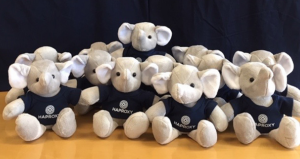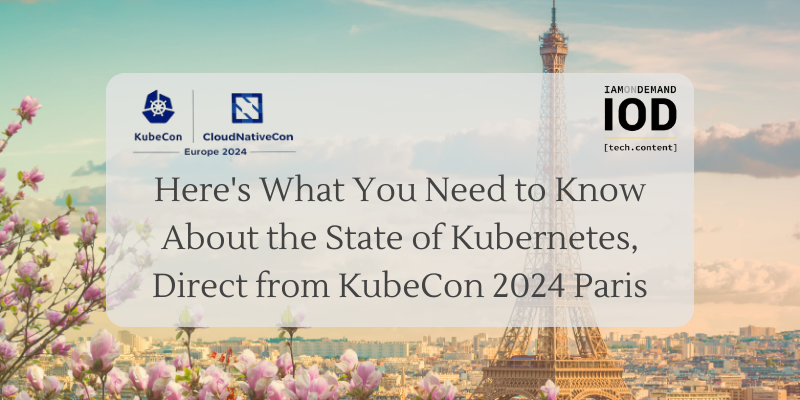This wasn’t just my first KubeCon—it may well have been the biggest KubeCon ever, with a reported 12,000 attendees.
Even though KubeCon is ostensibly an entire conference based on a single platform, it has an outsized influence on the industry, so I was looking forward to networking, learning, and soaking up ideas while I was in Paris. Whatever your interests, you’re sure to find someone talking about it at KubeCon.
I was blown away by the number of attendees, exhibitors, and the almost overwhelming number of sessions. Not all the sessions were up my alley—let’s just say that AI figured prominently—but because recordings of the sessions are all available on YouTube, I was grateful that I didn’t have to wear myself out running to every single promising event.

A Decade Old and Going Strong
Kubernetes was launched in September 2014—meaning this is the year it celebrates its tenth anniversary.
I’m going to admit here that I had my doubts back then. When I first tried it out, in 2017, Kubernetes seemed really unpolished and not exactly ready for prime time, so I went with AWS ECS on EC2 instances—a more robust solution at the time.
The landscape of application deployment and infrastructure management in Kubernetes has grown and matured substantially since then! So it was fun to wander around the floor and see the rich and varied ecosystems and solutions that have sprung up around Kubernetes—essentially creating the present and future of how we use the cloud and think about application development and deployment.
Biggest Buzzwords of KubeCon 2024
At every conference, it seems like there are themes that pop up over and over, ideas that everybody is talking about and implementing in one way or another. Here are the three most eye-catching from KubeCon 2024 Paris.
AI
There was just so much AI going on at KubeCon.
I’m sure most conferences out there will be heading in this direction, highlighting new use cases for AI along with improved safety practices, but for KubeCon, I was expecting a conference more tightly focused on Kubernetes and cloud-native infrastructure. So rather than attend the wealth of AI sessions, I focused my time there on sessions addressing the nuts and bolts of building and running with Kubernetes.
AI isn’t completely irrelevant at KubeCon. It seems clear that in the near future, AI workloads will increasingly be run on GPUs running in containers managed by Kubernetes.
And especially as Kubernetes deployments grow more complex, AI definitely has the potential to help manage complexity, streamlining infrastructure management by automating tasks and optimizing resource usage, using AI to create and scale our clusters instead of IaC.
Speaking of IaC… that was the next big buzzword going around KubeCon.
IaC
Everywhere I went, there was lots of chatter about what’s happening with infrastructure as code (IaC) in light of changes announced last summer by Terraform vendor HashiCorp.
While still open source, some features of Terraform Cloud are now under license. Not knowing what lies ahead and whether additional Terraform features could come under licensing in future, a group of developers announced that they were forking the project and keeping it alive as OpenTofu. OpenTofu day at KubeCon 2024 Paris drew a packed house, including this main stage panel around the IaC evolution featuring influential OpenTofu folks like Eran Bibi of Firefly and Roni Frantchi of env0, among others.
I still can’t wrap my mind around the idea that we might not be typing terraform plan or terraform apply in the near future due to the licensing issues, and I wouldn’t count out HashiCorp yet.
Wasm
This buzzword is one of the most exciting to emerge over the last couple of years. According to X user Torsten Volk, WebAssembly, or rather, its #wasm hashtag, took the number 1 spot of Kubernetes-related technologies at KubeCon 2024.
That’s no surprise, given that WebAssembly’s (Wasm) benefits include faster startup and run times, improved security (sandbox by default), extreme portability without recompiling, and a smaller footprint than containers that also uses fewer resources.
This definitely has the potential to revolutionize application deployment in Kubernetes.
That said, there’s some talk about whether Wasm will replace containers. I think it’s better to view it as part of a versatile toolbox that lets developers run these workloads side-by-side, expanding deployment possibilities. Containers are still ideal when you need access to resources like file system and network, while Wasm shines when it comes to performance-critical edge services like image manipulation or security-sensitive workloads.
My Top Session Picks
Sorry, AI. It’s true; as I mentioned above, I just couldn’t bring myself to attend AI sessions, even though there were lots to be had. I was far more interested in platform engineering, and here’s my selection of top session picks. Nothing can replace the actual experience of being at KubeCon, but these will get you as close as possible without needing to buy a plane ticket. 🙂
- How Spotify Re-Created Our Entire Backend Without Skipping a Beat with Nick Rutigliano & Daniel de Repentigny, Spotify
- Panel: Navigating the Path to Platform Engineering Excellence: A Comprehensive Guide with Cortney Nickerson, Kubeshop; William Rizzo, SUSE; Abby Bangser, Syntasso; Areti Panou, SAP SE; Aparna Subramanian, Shopify
- Application Modernization: From Concept to Kubernetes — George Hantzaras, MongoDB

- Platform Engineering with the Argo Ecosystem: The Elastic Story with Alejandro Martínez & Stephen Schmidt, Elastic
- eBPF’s Abilities and Limitations: The Truth with Liz Rice & John Fastabend, Isovalent
- Kubernetes as a Data Platform Panel with Robert Hodges, Altinity; Edith Puclla, Percona; Clayton Coleman, Google
- Kubernetes Security Blind Spot: Misconfigured System Pods with Shaul Ben Hai, Palo Alto Networks
Which session would I say was best?
For me, I’d have to say it was probably Building Container Images the Modern Way with Adrian Mouat, Chainguard. He is an engaging speaker who clearly brings with him a lot of hands-on experience.
Cloud-Native Ecosystem Developments
KubeCon doesn’t stand on its own, of course. The conference ran alongside CloudNativeCon Europe 2024, and that meant there were a couple of big developments announced in parallel from the CNCF.
- New Cloud Native AI white paper launch from CNCF promises to help engineers and businesses navigate the evolving landscape with current AI/ML techniques, cloud-native benefits, and future challenges.
- CNCF’s new Kubestronaut program is a recognition system for developers, admins, and cloud specialists who earn all five of their Kubernetes certifications. Earning all five won’t be easy, but I might challenge myself to try it over the next few years…
- New courses from CNCF focused on extending Kubernetes capabilities in specific areas like workflow management, autoscaling, security, and AI/ML.
And while less directly related to CloudCon, it was interesting to reflect on what will happen to the thriving Kubernetes ecosystem given the news out of Buoyant last month that “larger organizations”—those with 50 or more users running Linkerd in production, which isn’t really all that large, in my opinion—will soon have to pay a monthly fee of $2,000.
This has obviously eroded trust within the open-source community and discouraged open-source developers from continuing to contribute. But the fear and concern is not only about Linkerd. Rather, it’s about the potential ripple effect across the entire community: By breaking the expectation of free access to stable releases, users may feel discouraged about future contributions to and adoption of open-source projects. We’ll have to wait and see how this plays out.
Final Thoughts on KubeCon 2024 Paris
It’s always exciting to be surrounded by the latest and greatest, and KubeCon did not disappoint in this regard. And neither did the swag: from eye-catching Dagger socks to cute Haproxy stuffed elephants (its name is apparently Loady), not to mention all the tote bags you could ever want to haul it all around in.


One tip for future KubeCon attendees: We were late grabbing lunch on the first official day and the only choices that were left were vegan and fish sandwiches. Seems like most KubeCon folks prefer meat! So get to the lunch line on time or you’ll be forced to hike out to McDonald’s, as we had to. 🙂
See you at the next KubeCon, in Salt Lake City, Utah, from November 12 to 15, 2024!

